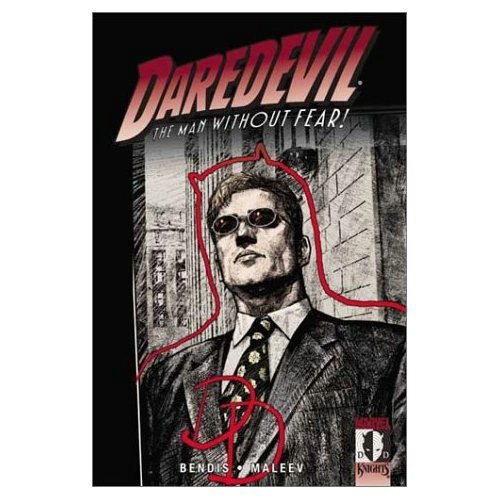
Well, these haven't aged well at all. I picked up this chunk of Daredevil written by Brian Bendis and mostly illustrated by Alex Maleev at a steep discount a few years ago. Bendis's story apparently begins in book three and concludes in book twelve, but what these volume numbers mean to anybody, I cannot guess. The eighth book reprints a storyline by other writers, and is so superfluous that the ninth book doesn't acknowledge it at all and the reading experience is not impacted by its absence in any way, leading me to question why Marvel published it in the first place.
This is a comic that does not hold up to scrutiny, and yet I recall enjoying the visceral experience of watching it unfold when I first read it. I can't imagine enjoying reading these as individual comics when they were each released. The pace is agonizingly slow, and each collection of five or six issues contains nothing that Steve Gerber or Frank Miller couldn't have told in just one.
I tried riding with the hype when Bendis launched a book called The New Avengers about five years ago. I lasted four months, sick to death of pages of nothing but slow zooms to a location - in a film, you might place some credits over those - or double-page splashes of explosions. If anything, his run on Daredevil manages to be worse. At one point, there's a double-page splash of Daredevil's girlfriend telling him the history of the Hell's Kitchen neighborhood. And man, people talk. It's entirely the opposite problem of the Marvel habit in the 1970s and 1980s of characters talking and thinking too darn much. These characters argue in long, pointless, oddly-parsed "natural" speech, with corrections and stumbles and stutters, questioning and interrupting each other. It might work well in film or in prose, but here it just feels like padding, forcing scenes to go on longer than anybody else in comics. One argument at the Daily Bugle offices about whether Daredevil's exposed identity counts as news goes on for ten pages. That's half the original comic.
Almost all the artwork is by Alex Maleev, who photoreferences to no positive effect. The action scenes are dull, static and hard to follow, and when he's forced to draw something that isn't something he can model, his deficiencies really show. One cliffhanger comes when Daredevil's old enemy, Typhoid Mary, shows up. Unfamiliar with the character, I thought for several minutes that she'd teleported Daredevil away with some orange cone thingy. Pages later, it turns out she set him on fire.
Quibbling over the artwork is a silly chore with comics this mediocre. The plot isn't a bad one: a former lieutenant in the Kingpin's organization outs Daredevil as attorney Matt Murdock, forcing Matt into the media spotlight, denying the charge while a host of other criminals try taking over the Kingpin's job. After a lot of back-and-forth, the crisis seems resolved and the tale skips forward a year. There's been some peace in the city, other heroes question Matt's actions, the Yakuza makes a bid for control and a reporter tries to learn what happened after Matt vanished.
This sounds like a great six-part story, collected in one book. It unfolds over twenty-six across four, with a retail price greater than $60. Maybe if Bendis and Maleev had decided against spending three pages showing Matt standing on his doorstep with hundreds of photographers flashing pictures of him and just got the hell on with it, we could have had that great six-part story. Not at all recommended.
No comments:
Post a Comment